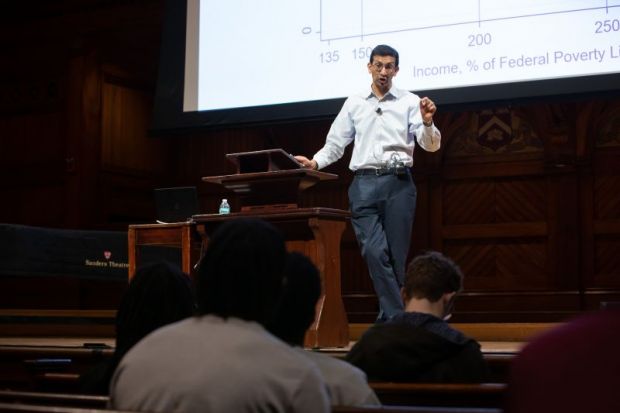A Harvard University economics course that favours data-heavy societal case studies over established formulas is surging in popularity among non-majors, in the latest validation for a reform model sweeping across US institutions.
The introductory-level course led by Raj Chetty, a pioneer of the transition, has grown in two years to a spring enrolment of 400 students, with three-quarters coming from outside the field.
Professor Chetty, a professor of public economics at Harvard, sees his course and similar versions at other institutions as helping move economics away from its history of formulas and philosophies that too often misjudge or ignore the diversity of human reality.
“It’s having an impact," Professor Chetty said, “both in terms of what people are choosing to study formally, and what kinds of careers people are thinking about – even for those who don’t change their major.”
The shift, said another practitioner, Adriana Lleras-Muney, a professor of economics at the University of California at Los Angeles, is taking advantage of changes in both technologies and attitudes.
The technical part, Professor Lleras-Muney said, reflects a growth in data and computer-aided processes for understanding the complex effects of governmental policies and corporate and personal behaviours.
The attitude adjustment, she said, concerns the realisation that economics can and should be studied through randomised trials in much the same way such experimentation is done in fields such as medicine.
That concept broke into wide public consciousness last year with the celebrated and controversial awarding of the Nobel prize in economics to Esther Duflo, Abhijit Banerjee and Michael Kremer.
Working at Harvard and the Massachusetts Institute of Technology, the three scientists have faced some accusations of promoting a research style that treats the world’s poor as test subjects. Yet they have also been credited with discovering valuable interventions for improving health and education in developing countries.
Professors Chetty and Lleras-Muney are among a group of educators translating such research insights into curricula. Other leaders include Betsey Stevenson and Justin Wolfers, spouses and professors of economics and public policy at the University of Michigan planning to release an examples-based textbook in the autumn.
In Professor Chetty’s case, the method includes asking his students to use data from the US Census and other sources to answer questions such as: “Why are your odds of coming to Harvard 100 times higher if you happen to be born to a parent in the top 1 per cent relative to the median of income distribution”.
In Professor Lleras-Muney’s class, assignments designed to pique student interest include calculating the long-term economic value of attending college.
The lesson, she said, is to challenge assumptions rather than repeat them. Examples of outdated dogma, she said, include the widespread belief that minimum wage laws cause unemployment, despite repeated evidence to the contrary. In economics, Professor Lleras-Muney said, “you still have generations of people who have been in some ways indoctrinated by these ideas that in fact have no empirical basis”.
Professor Chetty taught a version of his course for one year at Stanford University, then brought it to Harvard last year. One of his key measuring sticks is the traditional introductory economics course at Harvard led by Greg Mankiw, a professor of economics whose textbook is used at dozens of other universities.
The two courses are now pulling in similar enrolment numbers, with Professor Chetty counting at least 30 other colleges testing out his version. Professor Chetty said he is especially encouraged that his class is attracting gender balance in a traditionally male-dominated field, while Professor Mankiw’s version enrols nearly three-fifths men.
Professor Mankiw said he regards Professor Chetty's lectures as "terrific," and called his course "a complement for a standard introductory course, not a substitute." Professor Chetty said he agreed, though his data so far shows only about 36 of his 400 students also enroled in the course created by Professor Mankiw.
Register to continue
Why register?
- Registration is free and only takes a moment
- Once registered, you can read 3 articles a month
- Sign up for our newsletter
Subscribe
Or subscribe for unlimited access to:
- Unlimited access to news, views, insights & reviews
- Digital editions
- Digital access to THE’s university and college rankings analysis
Already registered or a current subscriber? Login







